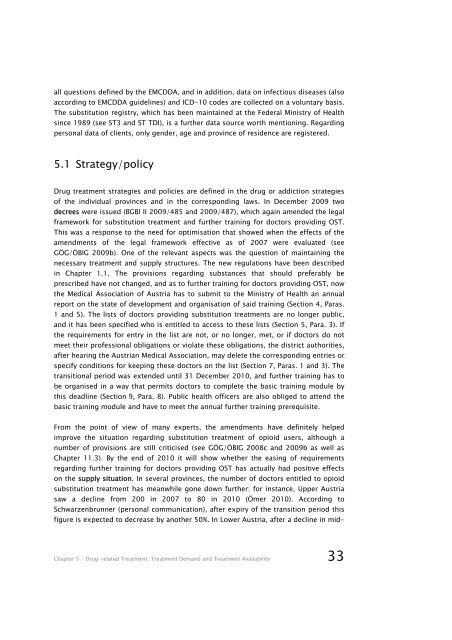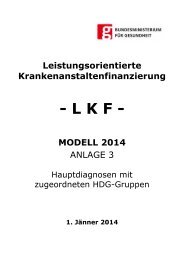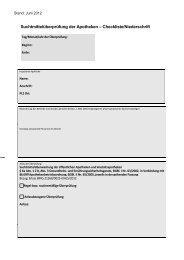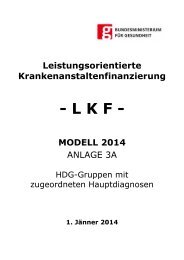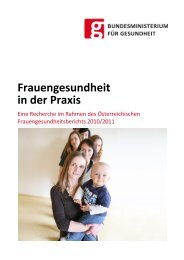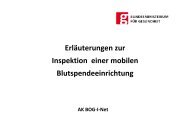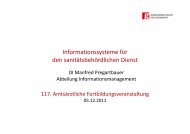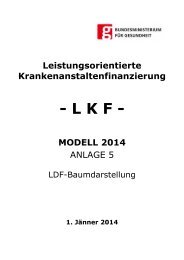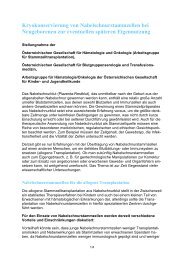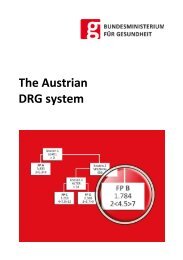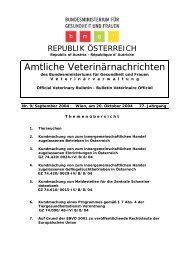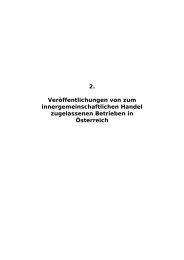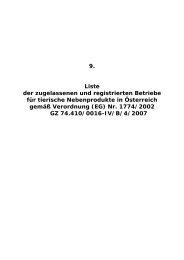Report on the Drug Situation 2010 - Bundesministerium für ...
Report on the Drug Situation 2010 - Bundesministerium für ...
Report on the Drug Situation 2010 - Bundesministerium für ...
Create successful ePaper yourself
Turn your PDF publications into a flip-book with our unique Google optimized e-Paper software.
all questi<strong>on</strong>s defined by <strong>the</strong> EMCDDA, and in additi<strong>on</strong>, data <strong>on</strong> infectious diseases (also<br />
according to EMCDDA guidelines) and ICD-10 codes are collected <strong>on</strong> a voluntary basis.<br />
The substituti<strong>on</strong> registry, which has been maintained at <strong>the</strong> Federal Ministry of Health<br />
since 1989 (see ST3 and ST TDI), is a fur<strong>the</strong>r data source worth menti<strong>on</strong>ing. Regarding<br />
pers<strong>on</strong>al data of clients, <strong>on</strong>ly gender, age and province of residence are registered.<br />
5.1 Strategy/policy<br />
<strong>Drug</strong> treatment strategies and policies are defined in <strong>the</strong> drug or addicti<strong>on</strong> strategies<br />
of <strong>the</strong> individual provinces and in <strong>the</strong> corresp<strong>on</strong>ding laws. In December 2009 two<br />
decrees were issued (BGBl II 2009/485 and 2009/487), which again amended <strong>the</strong> legal<br />
framework for substituti<strong>on</strong> treatment and fur<strong>the</strong>r training for doctors providing OST.<br />
This was a resp<strong>on</strong>se to <strong>the</strong> need for optimisati<strong>on</strong> that showed when <strong>the</strong> effects of <strong>the</strong><br />
amendments of <strong>the</strong> legal framework effective as of 2007 were evaluated (see<br />
GÖG/ÖBIG 2009b). One of <strong>the</strong> relevant aspects was <strong>the</strong> questi<strong>on</strong> of maintaining <strong>the</strong><br />
necessary treatment and supply structures. The new regulati<strong>on</strong>s have been described<br />
in Chapter 1.1. The provisi<strong>on</strong>s regarding substances that should preferably be<br />
prescribed have not changed, and as to fur<strong>the</strong>r training for doctors providing OST, now<br />
<strong>the</strong> Medical Associati<strong>on</strong> of Austria has to submit to <strong>the</strong> Ministry of Health an annual<br />
report <strong>on</strong> <strong>the</strong> state of development and organisati<strong>on</strong> of said training (Secti<strong>on</strong> 4, Paras.<br />
1 and 5). The lists of doctors providing substituti<strong>on</strong> treatments are no l<strong>on</strong>ger public,<br />
and it has been specified who is entitled to access to <strong>the</strong>se lists (Secti<strong>on</strong> 5, Para. 3). If<br />
<strong>the</strong> requirements for entry in <strong>the</strong> list are not, or no l<strong>on</strong>ger, met, or if doctors do not<br />
meet <strong>the</strong>ir professi<strong>on</strong>al obligati<strong>on</strong>s or violate <strong>the</strong>se obligati<strong>on</strong>s, <strong>the</strong> district authorities,<br />
after hearing <strong>the</strong> Austrian Medical Associati<strong>on</strong>, may delete <strong>the</strong> corresp<strong>on</strong>ding entries or<br />
specify c<strong>on</strong>diti<strong>on</strong>s for keeping <strong>the</strong>se doctors <strong>on</strong> <strong>the</strong> list (Secti<strong>on</strong> 7, Paras. 1 and 3). The<br />
transiti<strong>on</strong>al period was extended until 31 December <strong>2010</strong>, and fur<strong>the</strong>r training has to<br />
be organised in a way that permits doctors to complete <strong>the</strong> basic training module by<br />
this deadline (Secti<strong>on</strong> 9, Para. 8). Public health officers are also obliged to attend <strong>the</strong><br />
basic training module and have to meet <strong>the</strong> annual fur<strong>the</strong>r training prerequisite.<br />
From <strong>the</strong> point of view of many experts, <strong>the</strong> amendments have definitely helped<br />
improve <strong>the</strong> situati<strong>on</strong> regarding substituti<strong>on</strong> treatment of opioid users, although a<br />
number of provisi<strong>on</strong>s are still criticised (see GÖG/ÖBIG 2008c and 2009b as well as<br />
Chapter 11.3). By <strong>the</strong> end of <strong>2010</strong> it will show whe<strong>the</strong>r <strong>the</strong> easing of requirements<br />
regarding fur<strong>the</strong>r training for doctors providing OST has actually had positive effects<br />
<strong>on</strong> <strong>the</strong> supply situati<strong>on</strong>. In several provinces, <strong>the</strong> number of doctors entitled to opioid<br />
substituti<strong>on</strong> treatment has meanwhile g<strong>on</strong>e down fur<strong>the</strong>r: for instance, Upper Austria<br />
saw a decline from 200 in 2007 to 80 in <strong>2010</strong> (Ömer <strong>2010</strong>). According to<br />
Schwarzenbrunner (pers<strong>on</strong>al communicati<strong>on</strong>), after expiry of <strong>the</strong> transiti<strong>on</strong> period this<br />
figure is expected to decrease by ano<strong>the</strong>r 50%. In Lower Austria, after a decline in mid-<br />
Chapter 5 / <strong>Drug</strong>-related Treatment: Treatment Demand and Treatment Availability 33


